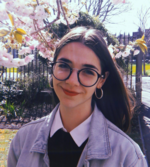
Julieta Abella is a PhD student in Literature at Universidad de Buenos Aires, where she is a Teaching Fellow and a Teaching Assistant. She completed her undergraduate studies and held a Graduate Student Research Fellowship (2019-2020) also within the same university and had academic stays in Trinity College Dublin and Central European University. Julieta has recently won a Doctoral Fellowship with the National Scientific and Technical Research Council in Argentina. Her current research project explores the influence of Socratic literature in James Joyce’s works, particularly in A Portrait of the Artist as a Young Man and Ulysses through the character of Stephen Dedalus. Other research interests include 20th century Irish literature, particularly the works of Brian O’Nolan (also known as Flann O’Brien), and Ancient Greek Philosophy, with a strong focus on the Socratics and Xenophon.

Gregory Baker is Assistant Professor of English and Director of Irish Studies at the Catholic University of America, Washington DC. He earned a Ph.D. in Comparative Literature at Brown University in 2013. Baker's research interests are broadly concerned with the literary, social and political Nachleben of classical languages and literatures in the twentieth century, and more specifically with the place that classical knowledge (and the institutions that governed its diffusion) had in the development of revivalisms and modernist response across the British Isles. His book, Classics and Celtic Literary Modernism: Yeats, Joyce, MacDiarmid and Jones is forthcoming this winter 2022 with Cambridge University Press. Other recent publications include work on the Scottish nationalist and Lallophone translator of Aristophanes, Douglas C.C. Young, as well as the annotated bibliography for volume 5 of The Oxford History of Classical Reception in English Literature (2019).
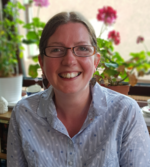
Mariamne Briggs completed her PhD in Celtic Studies in 2019 at the University of Edinburgh. She previously gained an MA Hons in Classical Studies and English at the University of St. Andrews (2005) and also holds an MSc in Classics from the University of Edinburgh (2007). Her primary research interest is in the reception of classical epics in medieval Irish literature and particularly in the Middle Irish translation of Statius’ epic Thebaid. She is currently writing up sections of her thesis for publication in journals. Her research on ‘Removing the Muses: Responses to Statian Subjectivity in the Middle Irish Thebaid’ was recently published in Crossing Borders in the Insular Middle Ages (2019).
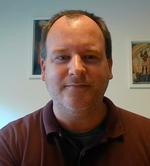
Mark Ølholm Eaton completed his PhD in History in 2007 at Western University (formerly the University of Western Ontario) in London, Ontario (Canada), and he now holds the position Associate Professor of the History, Society and Culture of Great Britain and the Commonwealth in the Department of English at Aarhus University. His current research focusses on the inter-play between political mythology, metaphor and history in contemporary British politics, with recent publications appearing in British Politics, Political Studies Review, and the International Journal of Politics, Culture and Society. His future research will focus on (among other topics) the place of classical references in 20th and 21st century English political discourse.
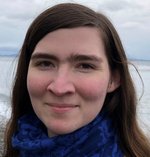
Brigid Ehrmantraut is a PhD student in the Department of Anglo-Saxon, Norse and Celtic at the University of Cambridge. She received her MPhil in Anglo-Saxon, Norse and Celtic from the University of Cambridge in 2019 and her AB in Classics from Princeton University in 2018 (with a Certificate in Medieval Studies). Her doctoral research focusses on the reception of Classical mythology in early medieval Ireland. This project is twofold: it aims both to examine specific translations of Classical gods and supernatural characters in medieval Irish adaptations of Classical texts, and to elucidate the influence of Classical sources on presentations of the pre-Christian past in the wider intellectual milieu of tenth- through thirteenth-century Ireland.

Gregory R. Darwin is Senior Lecturer in Irish and Head of the Celtic section at Uppsala Universitet, and a former Postdoc on the CLIC project's core Research Team. He earned his PhD in Celtic Languages and Literatures from Harvard University in 2019 after completing a BA double major in Classics and Celtic Studies at the University of Toronto (2013). He has previously taught modern Irish at l’Université de Bretagne Occidentale in Brest. His research interests include maritime folklore in Ireland and Gaelic Scotland and Early Modern and Modern Irish-language literature, and he has published several chapters and articles on these topics. In 2020-2021, for the CLIC project, Dr. Darwin examined the use of classical allusion and imitation in the works of Irish-language poets in the seventeenth and eighteenth centuries, especially the works of Dáibhí Ó Bruadair, Aodhagán Ó Rathaille and Seathrún Céitinn.
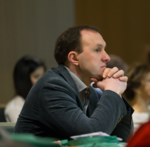
Maxim Fomin is Research Director of Modern Languages and Linguistics and Reader in Celtic Studies at Ulster University, and is concurrently Visiting Professor in Celtic Studies at the Centre for Breton and Celtic Studies, University of Western Brittany (Brest), where he is a Co-Director of the MA programme in Celtic Languages and Cultures in Contact. Dr. Fomin completed his PhD in Early Irish at University College Cork in 2003 where he discussed the concept of polity (‘righteous kingship’) in early Irish and ancient Indian wisdom and legal literature. An extended version of his thesis, Instructions for Kings, was published in 2013. He also defended his Candidate of Philosophical Sciences dissertation at Moscow State University where he discussed the notion of righteousness and its origins in the political culture of Classical and Hellenic Greece, ancient India, medieval Europe and Ireland. His research is focused on finding comparative typological parallels between early cultures, including Ireland, India and Armenia. Dr. Fomin has published extensively in this area, including the co-edited volumes Sacred Typology of Early Ireland and Ancient India and Ireland and Armenia. He is presently investigating the influence of the Late Roman world on early Ireland, especially the questions of diglossia and bilingualism in the earliest Irish documents (annals, genealogies, Ogham inscriptions).
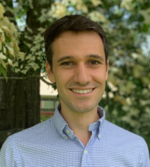
Justin Hudak earned his BA and MA in Classics from Yale University and is currently a PhD candidate in the Department of Classics at the University of California, Berkeley. His research interests revolve around Augustan poetry and its reception, as evidenced by both his undergraduate thesis ("Joyce’s Ovid: Ulysses Metamorphosed") and his doctoral dissertation ("Horace, Wallace Stevens, and the Sublime"). His recent focus on Horace and Stevens has by no means dampened his enthusiasm for Ovid and Joyce. Current projects include an essay on crosslinguistic wordplay in the Cyclops episode of Ulysses and a book-length study charting the evolution of the Irish writer’s stance toward his prime Roman precursor.

Victoria Krivoshchekova is a PhD student in Early Irish at Maynooth University. She completed her MA in Medieval Studies at the Central European University (Budapest, 2017). Her current research project explores views on the connection between thought and language in early Irish learned tradition, most importantly in grammar and exegesis. This research aims to establish how Irish scholars of the early Middle Ages, with their thoroughly bilingual view of the world, understood the problems of linguistic expression in relation to meaning and thought. An important aspect of this topic is the interaction of our Irish sources with the legacy of Classical and Late Antique linguistics, logic and semiotics. Victoria is preparing several essays based on this work for publication as journal articles.
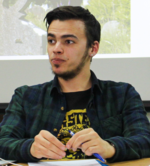
Feliks Levin completed his PhD in History at Saint Petersburg State University in 2017 and defended his dissertation Protonational myth and history in Geoffrey Keating’s Foras Feasa ar Éirinn at the Institute of World History of the Russian Academy of Sciences in Moscow in 2018. He was an associate professor at the Deaprtment of History of the National Research University Higher School of Economics, Saint Petersburg. He is now a Marie-Sklodowska Curie postdoctoral fellow at School of Communication and Culture, Aarhus University working on the project Irish Identities and Political Thought in Early Modern Historical Writing: Greek and Roman Sources.
His sphere of interests includes medieval and early modern ethnicity, Irish identity, early modern British composite monarchy, medieval and early modern Irish history-writing, political thought in Tudor and early Stuart Ireland, and cultural transfers in early modern Ireland including Classical influences.
Recent publications include ‘Representation of the tales of the Ulster cycle in Foras Feasa ar Éirinn: organisation of discourse and contexts’, Studia Hibernica 46 (2020): 1-25. In co-authorship with Sergey Fyodorov he contributed a chapter ‘Medieval Welsh and Irish Pseudohistorical Narratives: Some Theoretical Considerations’ to the proceedings of the conference Pseudo-History Among the Celtic-Speaking Peoples: Medieval Propaganda?” which will be published by the Dublin Institute for Advanced Studies, and a chapter ‘Cultural Practices and Local Identities in Early Modern Britain’ which will be published by Transcript-Verlag.
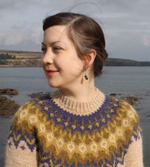
Kate Louise Mathis received her doctorate in medieval Gaelic literature from the University of Edinburgh in 2011, and has taught in the Celtic departments of Aberdeen, Edinburgh and Glasgow, where she is currently employed. She has published on Gaelic women’s poetry and elegy, and the reception of medieval Gaelic Ulster Cycle characters in Scotland. She is preparing a monograph assessing the development of Deirdre from her earliest portrayal to the Celtic Revival, with particular focus on the plays of Eva Gore-Booth and Fiona Macleod, exploring the extent to which Deirdre's perception as a romantic heroine emerges in the eighteenth century and supersedes her older function as a woman who mourns. With CLIC Research Affiliate Mariamne Briggs, she has begun to assess the depiction of grieving women in texts translated to Irish from Classical epic.
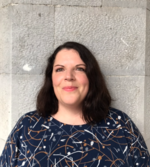
Ciaran McDonough is a Government of Ireland Postdoctoral Research Fellow in the School of Irish, Celtic Studies and Folklore at University College Dublin. She completed her PhD in nineteenth-century Irish antiquarianism at the Centre for Irish Studies, National University of Ireland, Galway in 2017, and has held research and teaching positions there. She has published several articles on aspects of nineteenth-century Irish antiquarian research, including folklore and the translation of medieval Irish texts. Her current project focuses on the nineteenth-century translation of the corpus of medieval Irish law. She is interested in how the Classical idea of the antiquarius was adopted and developed in Ireland, and how it intersected with terminology and ideas about traditional Gaelic learning.
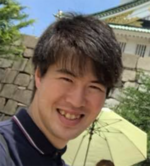
Maio Nagashima is a Research Fellow at the Japan Society for the Promotion of Science and a PhD candidate in Classics at the University of Tokyo. He earned his MA in Classics from the University of Tokyo (2018) after completing a BA at the Tokyo University of Foreign Studies (2015), where he has taught Latin since 2020. His research is focused on intellectual transfer from Graeco-Roman antiquity to Middle Irish literature, especially the medieval Irish prose adaptations of Latin epics. He has recently published ‘Lucan’s Simile in In Cath Catharda 567-70 and the Meaning of the Middle Irish Hapax uchtcrand’ (Philologica 14 (2019) 71-9), and will visit the CLIC research team in Spring 2021.
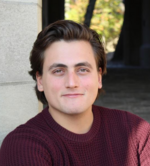
Claudio Sansone is a Humanities Teaching Fellow at the University of Chicago, where he received a PhD in Comparative Literature and an MA in Classics in 2021. He completed his undergraduate studies at Trinity College Dublin in 2014. His dissertation, "Poetics of Unease," focuses on the construction of tradition and authority through affect in Ancient Greek, Mesopotamian, and Indo-Iranian poetry. He is currently working on a paper that proposes an affect-centered approach to intertextuality and reception in Middle Irish recastings of Classical themes, treating a short poem that satirizes historiography surrounding the Persian Wars.
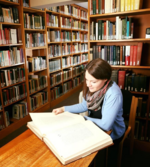
Marie-Luise Theuerkauf is a Leverhulme Trust Research Fellow in the Department of Anglo-Saxon, Norse and Celtic at the University of Cambridge. She completed her PhD in Old Irish and Old French at University College Cork in 2015 and has held research and teaching positions at University College Cork, the Dublin Institute for Advanced Studies, Maynooth University, the University of Cambridge, and Trinity College Dublin. Her research focuses primarily on the medieval Irish corpus of placenames called Dindshenchas Érenn ‘Lore of Eminent Place of Ireland’ on which she has published several articles and is about to publish her first monograph. She is interested in classical influences on the Dindshenchas and on medieval Irish literature more broadly.

Nicole Volmering obtained her PhD in Early and Medieval Irish at University College Cork, following degrees in both Early Irish and English language and culture. She has since held research and teaching positions at the Dublin Institute for Advanced Studies, Maynooth University, the Friedrich-Alexander University, Erlangen, and Trinity College Dublin and curated the exhibition Holy Time in the Trinity Long Room library. Her research interests broadly intersect on the language and history of the insular world and the history of Christianity, and she has published several articles on medieval Irish apocryphal literature, with a monograph on visionary literature and an edited collection on martyrologies on the way. She currently works primarily on martyrologies, insular manuscripts, and cultures of writing. A core part of her research concerns the transmission and adaptation of ideas and genres (especially cosmological and apocalyptic material) from the Classical and Late Antique periods into medieval forms of writing and the influence of classical rhetoric and genre on the framing of Irish writing, such as expressed in the accessus ad auctores.

Peter Graarup Westergaard completed his MA in Comparative Literature at Aarhus University (2004), with a focus on Platonism in Modern English Literature, and holds a degree in English literature and language as a supplementary subject, also from Aarhus University (2015). He has previously studied English literature at Concordia University, Montreal (2000-2001). In 2018 he resumed studies in philosophy at Aarhus University and at Oxford University, Department of Continuing Education. He completed his professional postgraduate teacher training in 2016 and teaches Danish, English, and philosophy at a secondary boarding school. His research interests related to the project CLIC include Platonism in the novels of Iris Murdoch and classical agricultural influences in the poetry of Seamus Heaney. Westergaard has published the poetry collection Nordvest (2017), also translated into English as Danish Northwest (2019).